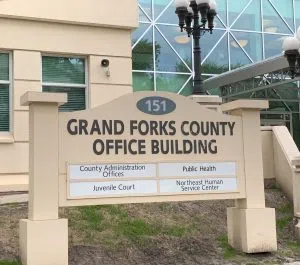 (Jeff Beach – North Dakota Monitor) – James and Jessica Tiegs are among the holdout landowners who have refused to sign on to the controversial Summit Carbon Solutions pipeline project to take carbon emissions from ethanol plants and store it underground in North Dakota.
(Jeff Beach – North Dakota Monitor) – James and Jessica Tiegs are among the holdout landowners who have refused to sign on to the controversial Summit Carbon Solutions pipeline project to take carbon emissions from ethanol plants and store it underground in North Dakota.
Summit is offering to pay landowners in exchange for an easement — the right to put the hazardous liquid pipeline through their land — but the couple says they value the land and safety over money.
“It goes right through some of our best farmland,” James Tiegs said. “I don’t want my family to farm over that.”
The North Dakota Public Service Commission on Friday will vote on whether to grant a route permit to Summit for 333 miles of pipeline in southeast and south-central North Dakota. The PSC denied Summit a permit in 2023, but the company made changes to its route in North Dakota and appealed the decision.
Summit will also need a permit for its permanent storage site west of Bismarck, which is under review by the North Dakota Industrial Commission.
Asked what they might do if the PSC approves the project, James Tiegs said, “We dig in.”
Digging in would mean bracing for a possible legal battle with Summit over eminent domain, which allows a private business to force landowners to provide an easement.
Eminent domain is sometimes used for projects when a court determines that the project has a public benefit that outweighs the rights of a landowner — such as building a road, a powerline or flood protection.
Approval by the Public Service Commission would not guarantee that Summit has the right to use eminent domain; that would have to come from the courts.
The couple is in the minority as holdouts. A Summit filing with the PSC said as of Oct. 9, it had obtained voluntary easements on about 81.4% of the miles it needs in North Dakota.
There are proponents of the project, especially among corn growers who say the project is needed to help ethanol plants survive in a world demanding more low-carbon fuel. Summit emphasized economic benefits to the PSC.
Tharaldson Ethanol at Casselton is the only North Dakota ethanol producer among the 57 plants on the five-state pipeline route.
The project also is being watched closely by the oil and gas industry. While Summit’s plan is for permanent underground storage, carbon dioxide can be used for enhanced oil recovery, potentially extending the life of North Dakota’s oil wells.
Summit has said it would use eminent domain as a last resort in North Dakota.
“We’ve taken the stance to work diligently to acquire as much as we can get voluntarily,” Lee Blank, CEO of Iowa-based Summit, told the North Dakota Monitor in April.
He said that if Summit is granted a permit, he expects more voluntary easements to come quickly.
“We’ll get it to a very small percentage of those folks that we have to work really hard on to find a voluntary arrangement,” Blank said.

The Tiegs’ property that Summit wants access to is near Ellendale in Dickey County, just north of the South Dakota state line. The family also farms in South Dakota and they are shareholders in Glacial Lakes Energy, which has four ethanol plants in South Dakota along the pipeline route.
Recent setbacks for Summit in South Dakota give them some hope that they can avoid a court battle because of possible reroutes of the pipeline in that state.
“Their path is going to be severely altered,” James Tiegs predicted.
The setbacks in South Dakota also highlight some of the differences in pipeline rules in the two states.
The South Dakota Supreme Court ruled that the Summit pipeline is not a “common carrier.” Common carrier status for pipelines is important for establishing the right to use eminent domain. In North Dakota, Summit has claimed common carrier status but attorneys for the PSC and landowners have different opinions on that claim.
South Dakota’s Public Utilities Commission in 2023 denied Summit a permit in part because of local ordinances that would stop the project. The North Dakota PSC has determined that state law supersedes local regulations on pipelines.
South Dakota voters on Nov. 5 defeated a ballot measure known as Referred Law 21. The vote reverses a law passed by the South Dakota Legislature that would have exempted carbon pipelines in South Dakota from the local zoning regulations, according to the South Dakota Property Rights and Local Control Alliance.
The ethanol industry campaigned to keep the law passed by the Legislature.
“I feel betrayed by the ethanol plants a little bit,” James Tiegs said.
Summit said after the vote that it will try again for a permit in South Dakota.
If North Dakota approves the project, the couple will be supporting their neighbors to the south who also oppose the pipeline.
“If anything good has come from this it’s the people we’ve met,” Jessica Tiegs said. “We have some new friends in South Dakota.”
Summit would benefit from federal tax credits of $85 per ton of CO2 that it plans to put underground in North Dakota, and would sequester 18 million tons of carbon dioxide per year.
“If they take the government money away from this, it falls flat on his face,” James Tiegs said.









